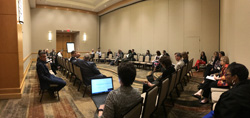
by Liz Gross, Director, Campus Sonar
“Someone once told me that if you make everybody uncomfortable, you’re probably doing something right.” These were the words Carlo Salerno, higher education economist and Vice President of Analytics at Strada Education Network, used to close the roundtable on public perception of the value of higher education. Roughly 30 enrollment management leaders engaged in a vibrant follow-up discussion to Salerno’s Sunday evening plenary session that touched on many topics including a competing intellectual and career-readiness mission, why students don’t complete college, and the role of college price in value perception. While many different opinions on the cause of decreased public perception of higher education’s value and how to address it were debated, the shared commitment to better understand the issue and start to make change was evident.
An Educated Citizenry Or A Career-Ready Workforce?
The group engaged in healthy debate regarding the ultimate value proposition of higher education: to create an intelligent populace that is ready to tackle the world’s problems, or to prepare individuals for a place in the workforce. Opinions were certainly mixed. One participant cited the CIRP Freshman Survey, which found that during the time period following the Great Recession, incoming students were increasingly focused on employability and other economic factors while making their college choices (although 2016 data is suggesting that orientation is changing). Others maintained that colleges and universities serve as a foundation of lifelong learning and critical thinking, rather than a direct path to a job.
Impact of Non-Completers on Value Perception
Students are less likely to value higher education if they fail to complete a credential, particularly if they find themselve with accumulated debt for a non-existent degree. With this in mind, the group discussed if the student or institution (or both) should be held accountable for not completing. An interesting thread in this discussion was the adoption of early alert systems on many college campuses, and what little data we have on how students perceive them. One attendee shared that their students see early alerts as micro-managing or picking on them, rather than the helpful resource they’re intended to be. Another said that their students felt that if they took advantage of the resources suggested in the early alert, they were in trouble or admitting failure. While the efficacy of early alert was clearly up for debate, the group also agreed that the answer doesn’t lie in performance-based funding, as institutions are not in control of many of the inputs that determine funding models.
College Price and Value Perception
When considering the experience of students and their families, we need to think about the trends in family income compared to college price. Median family incomes in the United States have increased by less than $1,000 since 1999, and decreased by $5,000 during the peak of the Great Recession. During this same time period, the net price at both public and private colleges has been increasing. One attendee shared that families don’t care why costs went up—they simply care that education is increasingly more expensive while families are not seeing an increase in wages. Additionally, the increase in price is not accompanied by an increase in completion rates. This, the attendee argued, can result in a very poor value perception.
Not Just A U.S. Issue
While most representatives in the discussion were from institutions in the United States, there were two attendees from Canada and one from the United Kingdom. The UK attendee shared that they’re seeing many of the same issues after recently increasing tuition and fees—the conversation shifts to career outcomes and career earnings. Unfortunately, their data is telling a story of unequal career and earnings outcomes for first generation students that complete the same curriculum as their peers who “know how to navigate the rules of the game.”
No Resolution, But A Call To Action
The industry’s problems related to the public perception of the value of higher education were not solved in this 90-minute discussion, but the group raised many valid points and engaged in a healthy discussion. Participants feel strongly about the importance of this topic and are motivated to act. Ongoing data collection and analysis on public opinion and value perception will be key to informing efforts to deliver the higher education experience(s) that the public finds valuable.